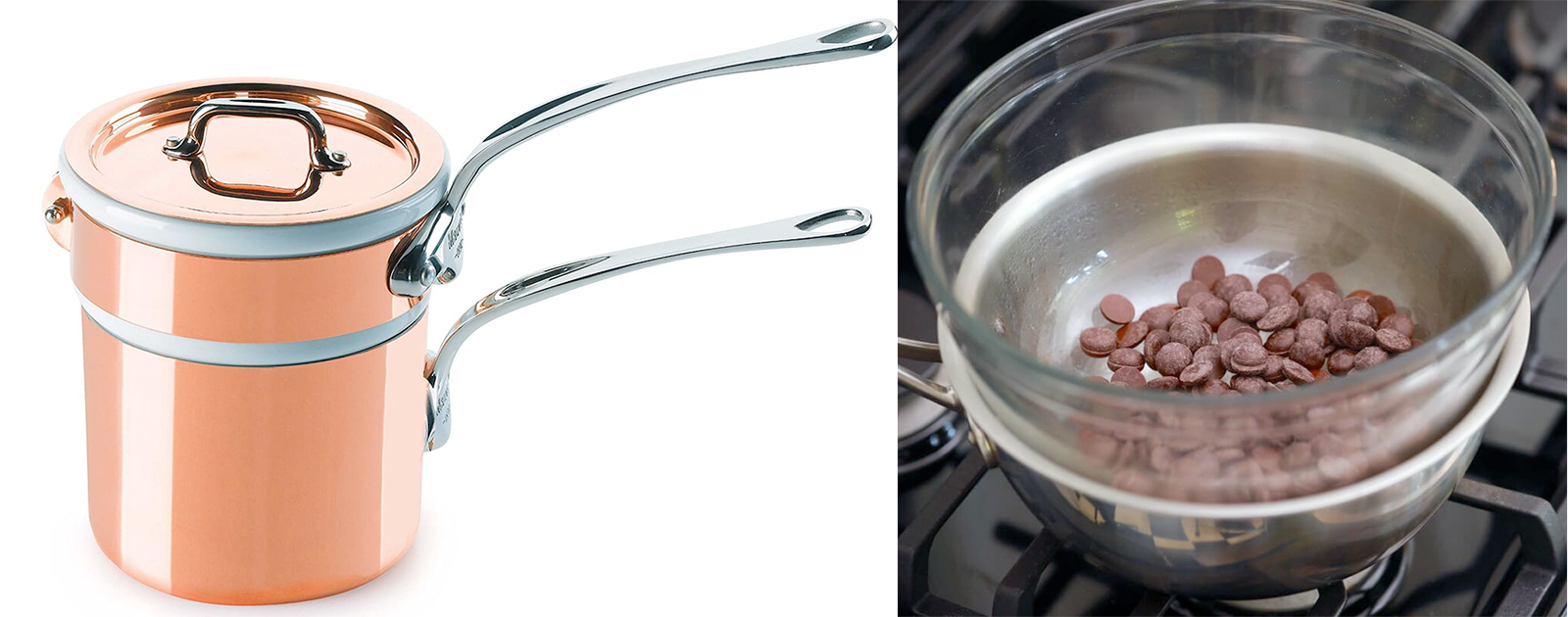 Purpose-built copper bain-marie (left) and the typical home-made
Purpose-built copper bain-marie (left) and the typical home-madeversion of a glass bowl set over a pan of simmering water.
Welcome to the summary page for FabulousFusionFood's Cook's Guide entry for Bain-marie along with all the Bain-marie containing recipes presented on this site, with 15 recipes in total.
This is a continuation of an entire series of pages that will, I hope, allow my visitors to better navigate this site. As well as displaying recipes by name, country and region of origin I am now planning a whole series of pages where recipes can be located by meal type and main ingredient. This page gives a listing of all the Bain-marie recipes added to this site.
These recipes, all contain Bain-marie as a major wild food ingredient.
The Bain-marie (also called a double-boiler or water bath) is a method for the gentle cooking of delicate dishes. It can be something as simple as a perspex bowl set within a saucepan of simmering water, or a roasting tin half-filled with water and set in an oven to cook a souffle or a mousse or terrine. Specific equipment can be bought for the same purpose but the simple solutions already described perform the job just as well.
The Bain-marie is generally used for dishes containing eggs or chocolate which would split or scramble if high heat were used during the cooking process. Once common mistake made when using a Bain-marie is that the bowl shouldn't touch the water. Rather the steam should heat the bowl.
Bains-marie were originally developed for use in the practice of alchemy, when alchemists needed a way to heat materials slowly and gently. In that early form of chemical science, it was believed by many that the best way to heat certain materials was to mimic the supposed natural processes, occurring in the Earth's core, by which precious metals were believed to be germinated. The name bain-marie comes from the medieval-Latin term balneum- (or balineum-) Mariae (balneo in Elizabethan English) — literally, Mary's bath — from which the French bain de Marie, or bain-marie, is derived.
Catering-sized versions include those for keeping food warm, metal trays in a bath of heated water.
This is a continuation of an entire series of pages that will, I hope, allow my visitors to better navigate this site. As well as displaying recipes by name, country and region of origin I am now planning a whole series of pages where recipes can be located by meal type and main ingredient. This page gives a listing of all the Bain-marie recipes added to this site.
These recipes, all contain Bain-marie as a major wild food ingredient.
The Bain-marie (also called a double-boiler or water bath) is a method for the gentle cooking of delicate dishes. It can be something as simple as a perspex bowl set within a saucepan of simmering water, or a roasting tin half-filled with water and set in an oven to cook a souffle or a mousse or terrine. Specific equipment can be bought for the same purpose but the simple solutions already described perform the job just as well.
The Bain-marie is generally used for dishes containing eggs or chocolate which would split or scramble if high heat were used during the cooking process. Once common mistake made when using a Bain-marie is that the bowl shouldn't touch the water. Rather the steam should heat the bowl.
Bains-marie were originally developed for use in the practice of alchemy, when alchemists needed a way to heat materials slowly and gently. In that early form of chemical science, it was believed by many that the best way to heat certain materials was to mimic the supposed natural processes, occurring in the Earth's core, by which precious metals were believed to be germinated. The name bain-marie comes from the medieval-Latin term balneum- (or balineum-) Mariae (balneo in Elizabethan English) — literally, Mary's bath — from which the French bain de Marie, or bain-marie, is derived.
Catering-sized versions include those for keeping food warm, metal trays in a bath of heated water.
The alphabetical list of all Bain-marie recipes on this site follows, (limited to 100 recipes per page). There are 15 recipes in total:
Page 1 of 1
| Béarnaise Sauce Origin: France | Gibraltar Caramel Flan Origin: Gibraltar | Mousseline Sauce Origin: France |
| Beef and Pistachio Terrine Origin: Britain | Lemon Curd Origin: Britain | Orange Curd Origin: Britain |
| Boudin de Café (Coffee Pudding) Origin: Ecuador | Lime Curd Origin: Britain | Sauce Bâtarde Origin: France |
| Cheese Paska Origin: Ukraine | Meadowsweet Lemon Curd Origin: Britain | Sauce Blanche Origin: France |
| Coffee Custard Cups Origin: American | Mousse de Gibier (Mousse of Game) Origin: France | Seven Minute Frosting Origin: American |
Page 1 of 1